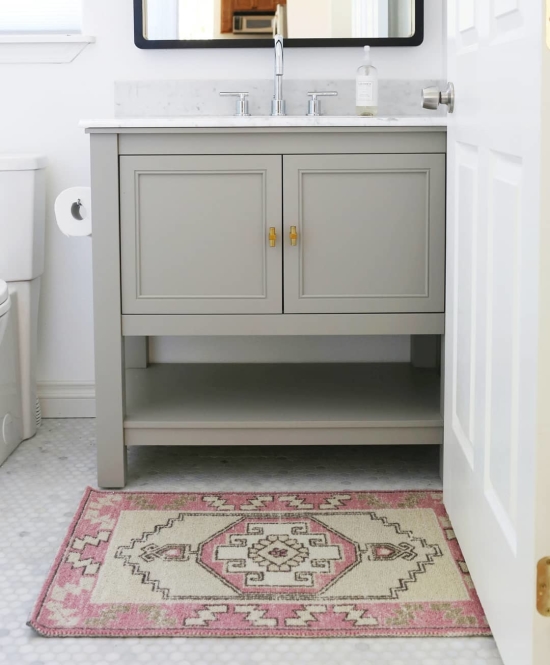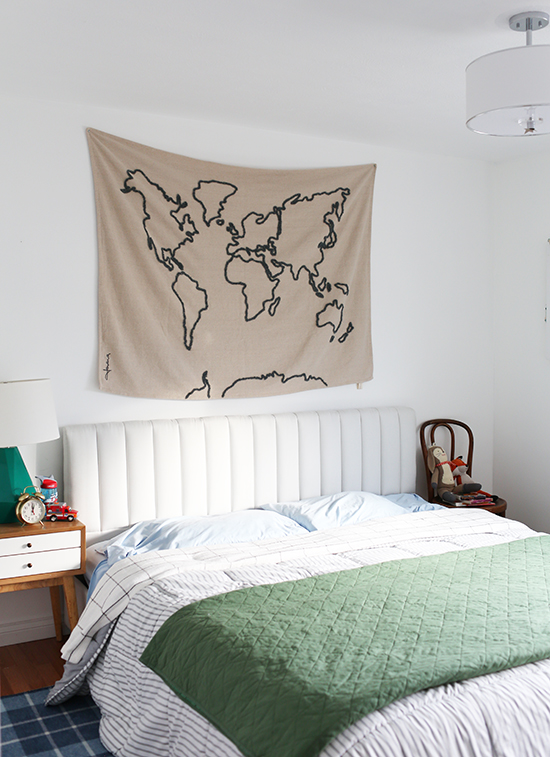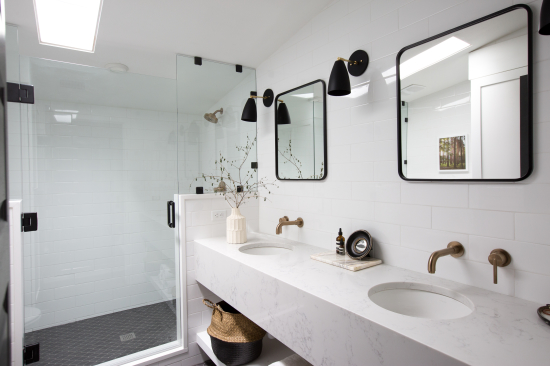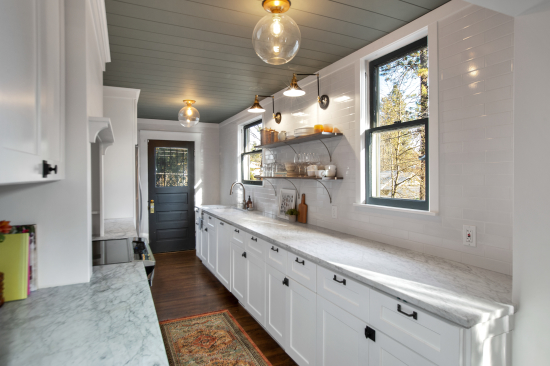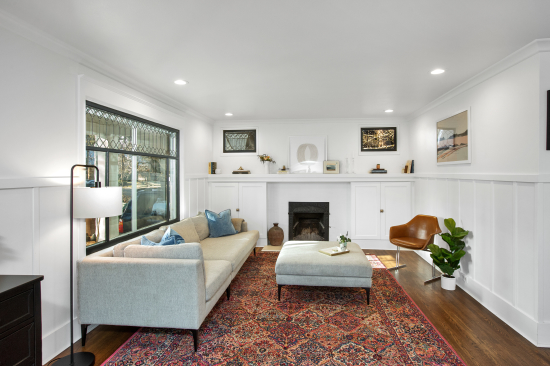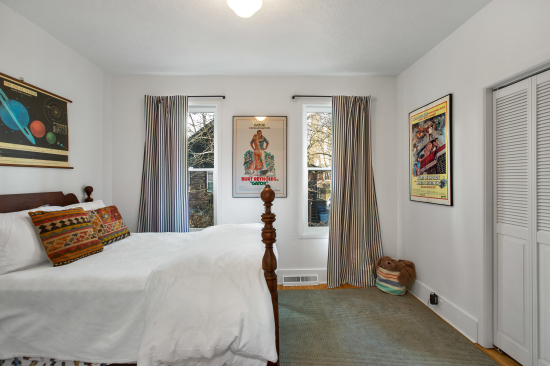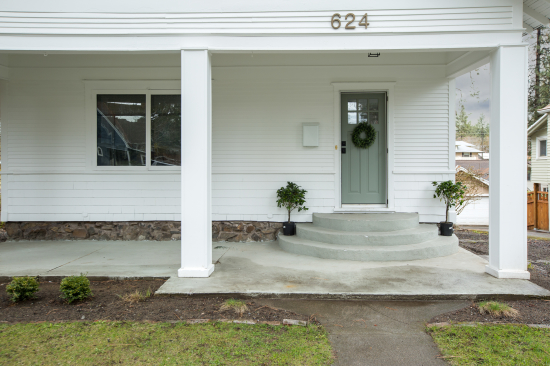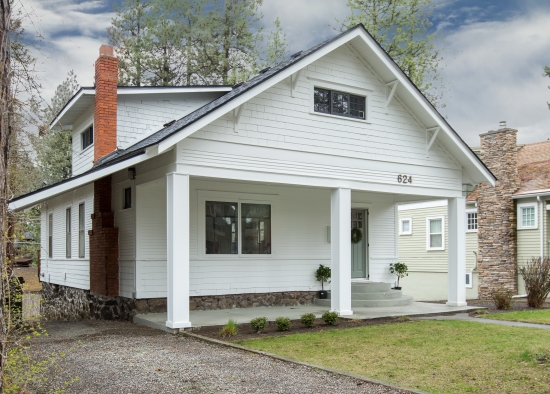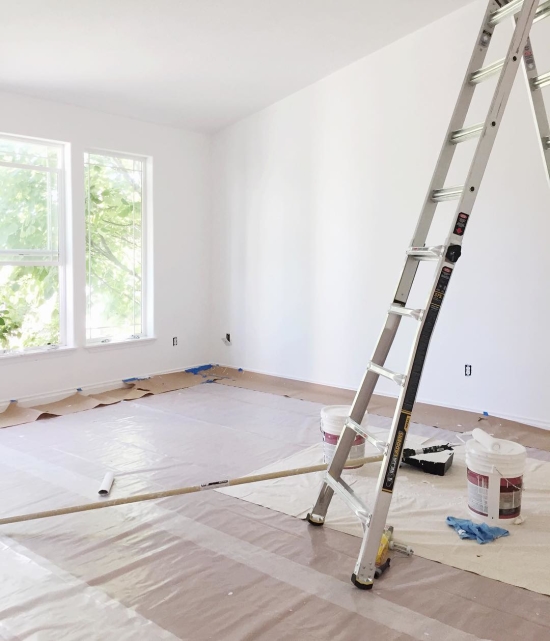25
This is a collaborative post. All opinions are my own.
Consumer culture is constantly urging us all to plan nights out. Drinks with friends, dinner dates, and if it's a special occasion (birthdays, anniversaries, or a manufactured holiday like Valentine's Day--ahem) then we gotta make it extra nice with an expensive meal, new outfits, and gifts for the occasion. But that's not the only way to do it! Sure, it’s enjoyable to spend an evening out on the town, but really, is there anything better than a cozy night in? Whether it's a simple date night with pizza and a movie after the kids go to bed, or a game night with just you and the family, or a dinner party where you invite friends to your house instead of going out...there's something really lovely about building special memories at home. As a couple of introverts, Ben and I are always drawn to this option anyways...we're homebodies. And with our commitment to try and be frugal in 2019, we're especially likely to stay home a lot this year. So I want to try and create some special nights in that are fun and intentional. Here's how!

1. Clearing Our Schedules
The lame thing about staying at home is that there are always practical tasks that need to get done: laundry, dishes, paying bills, decluttering, you know the drill. Sometimes that's the best part about going out, honestly--no dishes or distractions! But why not apply that same principle to a cozy night in? What if we dedicate one night where we won't feel obligated to get through our to-dos? No multitasking. We'll give each other the attention we deserve. No phones, no emails, no interruptions whatsoever. Obviously we can't ignore the practical tasks every night, but once in awhile I think this would really encourage conversation and connection: if we just gave each other our full attention! By treating a night at home as something special, I think it can become something special to look forward to, instead of just routine.
2. Making Our Home Extra Comfortable
If we’re going to be home a lot, then we'd better create a comfortable environment that allows us to relax! In the living room, plenty of pillows and throws nearby will make it extra cozy and inviting. I also think lighting is really important. In the evenings, it's nice to have side lamps that are warm, soft, and atmospheric, so you can unwind and hang out without the full blare of the overhead lights. Whether you’re watching a television series or movie, reading a book, or chatting with a cup of tea, soft lighting will help set the mood for cozy relaxation.
3. Having Entertainment On Hand
There's only so much time you can spend relaxing at home before you'll want to do something. Paying for a night of entertainment out of the house is usually pretty expensive: concerts, comedy shows, movies at the theater. Most of these things involve one-time ticket purchases that don't provide anything after the evening is over. I'm not saying never pay for tickets to a show--some things you really can't replicate at home. But for something you do repeatedly, a one-time purchase for at-home equipment can keep providing value over and over again. It's the concept of owning your own fancy espresso machine vs. buying lattes everyday, or setting up a home gym in your garage vs. paying for a monthly gym membership...there's an upfront fee, of course. But over time, it makes much more sense than continuing to dump money into rentals. If you're a big movie-goer, set up a home theater with a large television and a system that allows you to stream Netflix and the like (click for more information on how to get this in your home). Plus, don't forget the cheap forms of entertainment that can provide many hours of fun at home, with a very low setup cost. We love board games in our family!
4. Making the Food Fun
Food is a big part of any gathering. When we go out to eat, we often let ourselves indulge in something extra decadent. We can apply that to special nights at home too! Instead of making home a no-fun zone where we strictly adhere to a diet, we can designate nights where we treat ourselves to something we're craving. We can do this as a couple, with our immediate family, or with friends. Rather than meeting up to try the hip new restaurant in town, why not invite people over for a fun dinner (or morning brunch)? We're big fans of simple themes where everyone brings something to contribute, like charcuterie boards + games, or a New Orleans morning with beignets for breakfast + a big pot of gumbo for lunch, or a Bachelor viewing night complete with wine, chocolate, and popcorn. Honestly, we've found that--especially with kids--eating IN with friends is often much more fun than eating out.
What about you? Are you a homebody or would you go crazy without a regular night out? Any tips for making nights at home more memorable?
22
This is a collaborative post. All opinions are my own.
With the real estate market in Spokane rising much faster than what's typical for the area, recently I've heard a lot of people talking about how it's a "great time to sell" and gain all that equity. I'm tempted by that logic too...until I remember that we'd still have to buy a new house to live in, which will proportionately have risen in price just as much as our current house. In other words, rising house prices don't help us out unless we plan to move to a cheaper city or downsize to a smaller house (probably not what most of my generation is thinking when we talk about moving). Millennials have a reputation for changing jobs every few years. But while upgrading your job often tends to be good for career growth and salary, upgrading your house every few years is probably not as wise (unless you're doing "live-in flips" where you're gaining equity through improvements, not just from the overall market rising). Of course, there are instances when moving is the most logical choice: you're having another kid and outgrowing your current house, you got a new job and your commute will be terrible if you stay, etc. But those reasons are usually independent of the real estate market. If you're purely looking at financial gains, of if you're just tempted by the idea of something shiny and new, there are actually a lot of compelling reasons to stay put!
1. Avoid the Stress
Moving is easily one of the most stressful experiences in life. It's not just all the packing, cleaning, and organization it takes to get your house ready to sell. It's also all the time and mental energy it takes to look for a new house. Then, once you find the new house, there are inevitably projects that need to be completed over there. Plus, there are the logistics of switching all the practical matters: from small things like your mailing address, to big things like schools. It's exhausting! Especially if you have children with friends in your current neighborhood, really consider if it's worth it to move them away from their friends. It usually takes a few weeks or months for them to adjust to the new place, which can be avoided if you stay in your current home!
2. Don't Move, Improve!
If you still love your home's location, but the house itself no longer fits your family's needs, then it's worth pricing out what it would take to make you stay. It may end up actually making more sense than moving. Need more space? Consider a house extension, where you literally add extra rooms to your home. Whether it’s an addition behind your house, to the side, or even on top; you can get the room you need to live comfortably without going through the stress of moving.
Or you may not even need an extension! By adjusting the interior layout, you may be able to gain the extra bedroom or bathroom you need. Aesthetically speaking, a kitchen or bathroom renovation can also breathe new life into your property and make you fall in love with it all over again.
3. Save A Lot of Money
The financial impact of moving houses is not as simple as the purchase price of the new house minus the the selling price of the old house. With houses, the whole process of buying a new one and selling an old one is complicated and expensive. The biggest impact will likely be the transaction fees, which can be quite hefty: the real estate agent, stager, loan officer, and house inspector will all need to be paid. The government will also need its piece of the pie (yay, taxes!). Plus there are the many other smaller costs associated with moving, from buying paint to paying for the moving truck.
Of course, doing an addition or remodeling your house also costs quite a bit. But that money will directly improve the value of your home, versus all the transaction costs that are truly just money out of your pocket.
Don't get me wrong, I loooove the fresh possibilities of looking at new houses. I totally get sucked into Zillow and Realtor. I've looked up our house's estimated value and seen what's on the market for the same amount of money. I've watched a few of our neighbors' houses go up for sale and thought, "hmmm, what if?" It's tempting!!! But in reality, it doesn't make financial sense for us. I've heard that typically, with all the costs related to buying & selling real estate, you should live in your house for at least five years to make it worthwhile (vs. renting).
So for now, we are content to stay and continue improving our house, slowly but surely. Next up on our list? The kids' bathroom, which we will start on next month!!! I will share my plans and inspiration for that space soon.
17
I just posted this house on my Inside Spokane account, but I thought you all might like it too! It's a gorgeous, fully remodeled 1908 Craftsman that's for sale in the city where I live. I'm obsessed with the master bathroom: rounded rectangle mirrors, wall mounted faucets, floor to ceiling tile, extra thick counters, black accents. It's super on-trend, but also classic and chic. I'm definitely saving this as inspiration!
It's been fun for me, digging into local design in my city. I love finding gems that aren't all over Pinterest yet. It's been fun to get inspiration from more uncommon places, such as real estate photography in Spokane.
I love this front entrance too! The rounded stairs are so cute, and that's a great door color. We're working on updating our front door and entrance right now...I'm excited to show you soon.
And that's it! I'm keeping this post short & sweet! See more of this cutie pie house on my Instagram & the listing right here.
15
This is a collaborative post. All opinions are my own.
If you read this blog, I'm guessing you love interior design and decorating your home. Perhaps like me, you've also entertained the thought of flipping houses. When done right, house flipping is an awesome way to use your decor skills in a financially smart way, that adds income to your bank account, instead of subtracting from it. It may seem like the best of both worlds: a way to indulge your love for design, while also earning some side money and improving your financial position. And it definitely can be! However, where there's opportunity to gain a lot of money, there's also the risk of losing a lot. House flipping isn’t always easy, and you could find that you are faced with a variety of issues you didn't anticipate, which need to be swiftly dealt with. So it's super important to do your research, make sure you're in a stable financial situation, and learn from other successful house flippers! From what I've seen, it makes a lot of sense for beginners who don't have a ton of extra cash to start with the house you live in. Buy a house that's below market value with plenty of room for improvement, and fix it up while you're living there--that way, you're not paying an extra mortgage while you work on the renovations. Do it well, and you could make quite a nice profit from selling the improved property! In my research, I've also found some other useful "golden rules" that beginners should stick to when flipping their first property.
Start Off With A Small Project
One of the first things to understand is that your first flipping project should be small and relatively easy. You don’t want to throw yourself in the deep end, that’s for sure! It’s much better to start off with a easy project that you should have no problem managing, and then building up your skills and experience from there. If this first one is a success, then you can always take on a slightly trickier project next time if you decide that you want to continue with more house flipping.
Make Sure You Have Great Credit
You will also need to make sure that you have a good credit rating before you move forward with flipping a house. This will help you purchase the property in the first place, as good credit will open you up to a lot more mortgage options. Once you have a good credit report, more lenders will trust you with a loan. Because of this, they will be a lot more likely to offer you their best deals, which means you won’t need to worry about high-interest rates being added onto your loan repayments. But good credit won’t just help you when it comes to purchasing the property. It will also help you get any loans that you require for maintenance and work carried out on the property. Read these credit score tips if you have a bad credit score at the moment.
You Need Cash As Well
It’s not a good idea to rely on loans and other forms of credit for you to flip a house, though. If you are too reliant on these forms of financing, you might find that it can be all too easy to spiral into debt that you can’t afford to pay back, even after you have sold the house that you flip. So, it’s a good idea to save up and have a stash of cash in the bank that you can dip into for any small jobs or work that need carrying out on the home. You will find that this helps you stay in the black throughout the whole of the flipping project, which will ensure that your finances stay healthy.
Location, Location, Location
If you haven’t yet decided on the area in which you will buy your project property, it’s best to narrow down your options so that you are only looking at good locations. These should be neighborhoods that buyers are eager to move to because they are safe and have good schools and amenities. If you flip a property in this kind of area, then you should find it sells very quickly and for a good price too. It could also be worth looking to buy a house to flip in an up-and-coming area too. This is an area that is currently undergoing a lot of improvement and is favored by young families and students. There will be a lot of gentrification in the area, which is always a good sign as it shows that property prices are slowly on the rise.
Buy Cheap
One thing to remember is that you generally make your money when you buy the house. That means you should know on the day you close that you got a good bargain. Of course, the work you do on the house will also increase its value, but starting with a house that's below market value gives you a great head start and a safety net. Plus, if you do buy cheaply, then you will have a lot more money left over in your budget to carry out various jobs and maintenance. So, when you are house hunting for a property to flip, be sure to keep an eye out for homes that have been priced to sell.
Always Get A Home Inspection Before You Buy
Just because you’ve found a house that appears to be a good value, doesn't mean you shouldn’t jump on it just yet. It's super important to get an inspection done by a professional home inspector and get estimates for the issues they find (there will always be something they find). A home inspector will carefully examine the property and determine if there are any structural issues or other problems that should give you cause for concern. For example, they might find that there is some urgent work that need to be completed, that may end up being very expensive. If this is the case, you might want to disregard the property and look elsewhere for a house that isn't as pricey to improve. Or if you're not scared off by this, you can use it to negotiate a much lower price that will leave you the money needed to carry out those repairs right away.
Invest In Key Rooms
When you buy a house to flip, time is of the essence. So once your offer is accepted, before you even get the keys, you should strategize which improvements to focus on. You will probably have a lot of decorating and maintenance to carry out, and it may be overwhelming. Trying to figure out where to start is can be quite difficult for beginners. However, one general rule of thumb is that you'll get the most value out of investing time, energy, and money into the bathrooms and kitchen. You should make sure that these well done and feature contemporary fittings. It’s worth taking a look at Drench and other sites that sell kitchen fittings to make sure you choose good-quality fixtures that look up to date. Most buyers want to see new or recently installed bathrooms and kitchens, so they don't have to deal with those expensive and messy remodels once they move in. Focusing on these rooms can help you increase the value of the property dramatically, and ensure that it sells as quickly as possible.
Be Prepared To Do Some Networking
Most people who carry out regular flipping projects find that networking with other property investors can be very beneficial for them. It gives them the chance to meet with other people who are doing what they are doing, and allows them to share tips and tricks. You should also network with prospective buyers and find out exactly what they are looking for in a new property. You never know; you might buy the perfect buyer for your next flipped property! Networking can also be a great way to find the perfect house to buy--before it even hits the MLS. Off-market deals are a great way to get a good price and eliminate the competition!
Use Reliable Contractors
When you are flipping a property, you will no doubt need to hire some contractors to take care of some of the more complicated home maintenance jobs. The older the property is, the more contractors you will need to work with to bring it up to standard. A shady contractor can end up costing you a lot of money and time (and when flipping, time is money). It's essential that you do plenty of research, get recommendations, and call references, to ensure that you hire reliable and trustworthy contractors. You'll also want check out their portfolio--or better yet, check out one of their completed jobs in person--to make sure that you are happy with the standard of work that they carry out. It’s also important to get multiple quotes so you know you're getting a good price. You don't necessarily want to hire the cheapest person (that can be a red flag), but you certainly don't want to overpay either.
Ensure You Have Plenty Of Time
One of the main things to remember when it comes to flipping homes is that it takes time. Renovations nearly always take longer than you initially thought, because surprises come up, weather may not cooperate, and contractors have other jobs they're juggling. You don't want to end up rushing at the end to hit an aggressive or overly optimistic timeline--that will certainly show in the results. If you're doing the work yourself while also working your full-time job, then you'll definitely want to give yourself a long timeframe so you don’t get too stressed out. Expect that issues will crop up that could push your timeline back, and make sure you have built in a cushion of time (and money) to deal with those issues.
Flipping a house seems like a really exciting and fun project, especially for those of us that love interior design and home decor. But it can also be quite frustrating if things start to go wrong. Have you flipped a house before? What are your "golden rules?"



